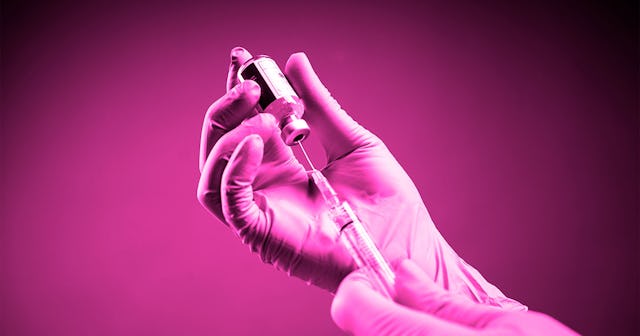The Idea That COVID Vaccines Cause Infertility Is A Conspiracy Theory

Since the very beginning, science-backed information about COVID-19 has had to compete with problematic and troubling myths and conspiracy theories. Unfortunately, in some corners of the Internet, science isn’t winning, and new myths find space to flourish.
One of the most recent myths to emerge concerns the COVID vaccines. Yes—the very same vaccines that have the ability to help us safely exit this pandemic.
RELATED: Looking For Tips On How To Get Pregnant Fast? Here’s What You Should Know
The myth is that the COVID-19 vaccines will cause infertility in women. (If that feels vaguely familiar to you, we’ve probably watched the same Amazon Prime show which premiered during the pandemic.)
To be clear, the COVID-19 vaccines do not cause infertility. That is a myth. It is not true.
The American College of Obstetricians and Gynecologists (ACOG), the American Society for Reproductive Medicine (ASRM), and the Society for Maternal-Fetal Medicine (SMFM) confirmed as much in no uncertain terms in the following statement. They wrote, “We also assure patients that there is no evidence that the vaccine can lead to loss of fertility. While fertility was not specifically studied in the clinical trials of the vaccine, no loss of fertility has been reported among trial participants or among the millions who have received the vaccines since their authorization, and no signs of infertility appeared in animal studies. Loss of fertility is scientifically unlikely.”
To understand more about vaccines and fertility, Scary Mommy touched base with neonatologist Dr. Kevin Kathrotia from Millennium Neonatology to get the facts.
The Myth Probably Came From A Letter Sent By Anti-Vaccination Advocates
Frequently, it’s difficult to pinpoint from where a myth emerged. In this case, however, there’s some consensus that it came from a letter sent to the European Medicines Agency by two individuals with anti-vax backgrounds. They raised inaccurate concerns that the vaccine contains a specific protein, Syncytin-1, which is critical for the human placenta. However, the COVID-19 vaccines do not contain that protein. COVID’s spike protein and Syncytin-1 have a very small stretch of genetic code in common. To understand why that’s irrelevant, consider a phone number that shares a single digit in the middle. Sure, one number matches, but if the other nine don’t, you won’t reach the intended person. Likewise, even if a tiny portion of genetic code is similar, it’s not the same code.
Alongside the claim that the vaccine contains the protein necessary for human placenta is the myth that the vaccines cause the body to generate antibodies that would reject the protein, thereby causing infertility.
That is overwhelmingly untrue. The authors of the letter that bore this myth admit that the vaccine does not create antibodies that would reject the protein necessary for the placenta. They write “there is no indication whether antibodies against spike proteins of SARS viruses would also act like anti-Syncytin-1 antibodies.”
The Real World Contradicts The Myth
Luis Alvarez/Getty
The Pfizer trial included more than 37,000 people. During the trial, 23 people became pregnant—12 in the vaccine group and 11 in the placebo group. Put into perspective, in a random pool of people, the number of vaccinated people who got pregnant is the same as the number of non-vaccinated people who got pregnant. Very obviously, the vaccine did not make a difference.
The Vaccines Are Safe For Pregnant People
According to Dr. Kathrotia, “The American College of Obstetrics and Gynecology (ACOG) currently states that the COVID-19 vaccine should not be withheld from pregnant patients.” Likewise, he confirms that, “those trying should not be discouraged from receiving the vaccine.”
The only people who should not get the vaccine are those who are contraindicated to get the vaccine, regardless of pregnancy. “This includes anyone who has had an adverse reaction to the vaccine or any of its components,” Dr. Kathrotia wrote in an email. He also noted that though there are no studies on the matter, “it’s probably best to wait out the commonly known symptom period of 1-2 days,” before trying to get pregnant.
Pregnant People Are At High Risk For Developing Severe COVID
Aleksei Morozov/Getty
The true danger here is the myth. Vaccines do not cause infertility, but pregnancy puts a person at a high risk of developing severe COVID. Studies of pregnant people with COVID have proven that infection increased the risk of complications. This means that rather than avoiding the vaccine, those individuals who plan to become pregnant should get vaccinated ASAP. The known risks of COVID-19 while pregnant far outweigh the make-believe risk created by a myth.
Immunity Can Be Transferred To Your Baby
Not only are the vaccines safe, and not only could they protect you from developing severe COVID if you become infected during pregnancy, but there’s another added benefit to vaccination: protection for your baby.
Dr. Kathrotia confirmed that there’s been evidence of immunity transferring to the baby both when the pregnant person gets the vaccine while pregnant and becomes pregnant some time after receiving the vaccine. “There has been evidence of both scenarios resulting in antibodies being passed down to the baby.”
The takeaway of all this is two-fold. One, the vaccines are safe. They do not cause infertility. Two, don’t trust what you read on the internet. News travels fast. Falsehoods travel faster. When it comes to vaccines, pregnancy, and fertility be sure to speak with your doctor and seek out credible sources.
Information about COVID-19 is rapidly changing, and Scary Mommy is committed to providing the most recent data in our coverage. With news being updated so frequently, some of the information in this story may have changed after publication. For this reason, we are encouraging readers to use online resources from local public health departments, the Centers for Disease Control, and the World Health Organization to remain as informed as possible.
This article was originally published on